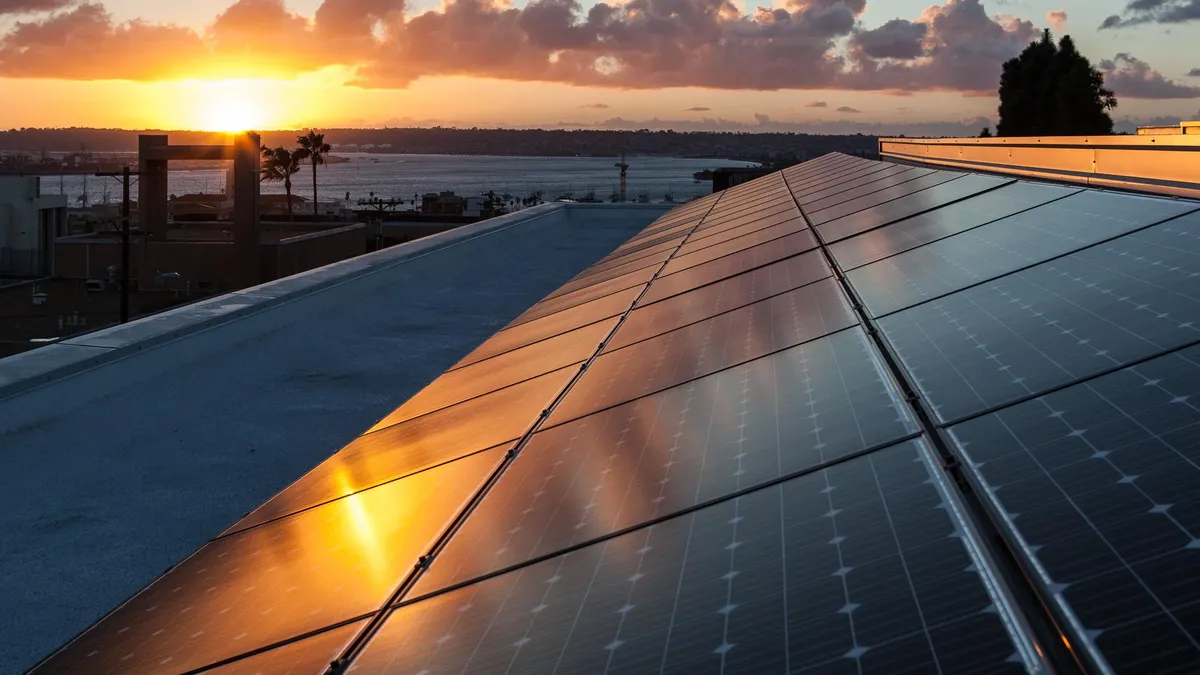Dive Brief:
- The Public Utilities Commission of Nevada (PUCN) released a draft order Wednesday evening that said regulators will review a provision in a recent decision on solar net metering that applies new rates and charges to exsisting rooftop systems, as well as new ones.
- The PUCN approved new net metering rates in December that will lower the remuneration rate for net metering and raise fixed charges for rooftop solar customers. Controversially, the new rates and charges apply both to existing and new rooftop solar systems, instead of "grandfathering" in existing systems and allowing them to keep their retail rate remuneration.
- The draft order echoes a request by the the Nevada Bureau of Consumer Protection (BCP) to reexamine the grandfathering provision.
- Two major solar developers have already ceased operations in the state in response to the order, while a group of rooftop solar customers filed a class action lawsuit against NV Energy.
Dive Insight:
Nevada's new net metering rates sparked swift backlash, especially against the provision to include all existing net metering customers in the new policy.
Now the PUCN has released a draft order to review the controversial provision, but that doesn't include a broader re-evaluation of the policy, which the BCP requested. Greentech Media reported that BCP testified that existing solar customers should grandfathered in to the new policy for a minimum period of eight to 10 years.
PUC staff claimed that timeline would result in a $128 million to $160 million cost-shift, according to Greentech.
The new policy decreases the rate paid to rooftop solar customers for the power they export to the grid from the retail rate of the electricity to the wholesale rate. Under the decision, the changes would apply to all solar customers, even those with rooftop solar contracts that assume retail rate remuneration.
The new rates will increase the monthly charge for NV Energy customers who own solar from the $12.75 to $17.90 and decrease their volumetric rate from $0.111/kWh to $0.108/kWh.
The net metering credit for present and future solar owners would fall from $0.11/kWh to $0.09/kWh in the first year, and then to $0.026/kWh in 2020.
Monthly basic service charges will scale up gradually to reach $38.51 and the volumetric rate will fall to $0.099/kWh over four years.
The PUC also created a seperate rate class for all small commercial and residential net metering customers and added a time-of-use pricing option for all. The new rates and increases in fixed charges are designed to better recoup infrastructure costs from customers with rooftop solar, who the utility charges do not pay their fair share for grid upkeep.
In May 2015, state legislators directed utility regulators a solar tariff that is satisfactory to both solar installers and NV Energy by the end of the year. NV Energy, the state's major electric utility, proposed to lower the remuneration rates for solar customers and increase fixed fees, arguing that net metered customers don't pay their fair share to maintain the grid.
NV Energy had anticipated hitting the net metering cap by early 2016, despite warnings from solar installers that the quick pace of solar PV installations would mean the cap would be hit earlier than the projected timeline.
The net metering cap was reached in August, which temporarily halted solar installations and spurred Vivint Solar's exit, the first of three. In response, regulators voted unanimously keep retail rate remuneration place through the end of the year, setting the stage for the new rate structure, which was unveiled in late December.
Last week, regulators denied a request to stay the ruling, which would have delayed implementation of the entire set of new rates. The next meeting of the Nevada PUC is set for Jan. 25.













